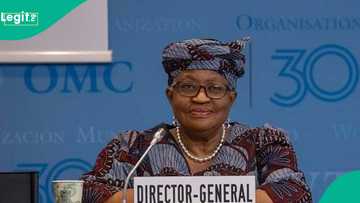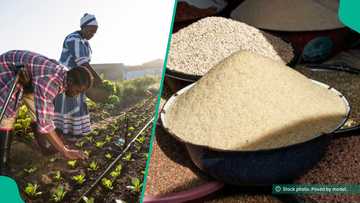FG Announces ₦100k Interest-Free Loans for Nigerians and Traders Under GEEP Scheme
- The Nigerian government has unveiled a N100,000 interest-free loan scheme under the Government Enterprise and Empowerment Programme (GEEP) scheme
- The disbursement will commence before the end of 2025, government officials explained in a recent statement
- The programme managers said the scheme is part of ongoing efforts to reduce poverty and support informal businesses in Nigeria
Legit.ng’s Pascal Oparada has reported on tech, energy, stocks, investment and the economy for over a decade.
The Federal Government has announced the rollout of interest-free loans of up to ₦100,000 for smallholder farmers, petty traders, and micro-business owners across Nigeria.
The initiative, under the Government Enterprise and Empowerment Programme (GEEP), will begin disbursements before the end of 2025, according to officials.

Source: Facebook
Loan categories: FarmerMoni, TraderMoni, MarketMoni
Speaking in Kaduna during an engagement with traders’ associations and stakeholders, programme managers said the intervention is part of ongoing efforts to reduce poverty and support informal businesses that drive much of Nigeria’s economy.
Under the scheme, small-scale farmers engaged in poultry, aquaculture, crop production, and livestock rearing will benefit from FarmerMoni.
Loans will allow them to purchase essential inputs such as fertilisers, veterinary drugs, and farm tools.
Petty traders and youth entrepreneurs will access funds under TraderMoni, while women in small-scale commerce will be supported through MarketMoni.
All loans will be disbursed without collateral or interest, making them accessible to Nigerians often excluded from conventional banking systems.
Loan amounts and repayment terms
Officials confirmed that loan amounts will range from as little as ₦5,000 to as high as ₦100,000, depending on the scheme.
Beneficiaries will also enjoy a six-month grace period before repayments commence, giving them time to reinvest the funds into their businesses.
“These are not grants but repayable loans designed to help Nigerians grow their businesses, join the formal financial system, and create jobs,” the programme manager explained.
He added that robust monitoring and evaluation frameworks would be put in place to ensure accountability and sustainability.

Read also
Apply: Nigerian bank opens application for N20m grant, lists requirements, target beneficiaries
Transparency and community involvement
To avoid abuse, the government is working with cooperatives and traders’ associations across Nigeria’s 774 local government areas.
MSME Africa reported that the GEEP desk officers and field enumerators will oversee selection to ensure that only deserving beneficiaries are enrolled.
The scheme, first launched in 2016, has been restructured to address past challenges with delivery and accountability.
Officials said the 2025 pilot rollout would pave the way for broader nationwide implementation in 2026.
Stakeholders welcome the move
Market leaders and grassroots associations have welcomed the development, praising the government’s decision to back small businesses with interest-free financing.

Source: Twitter
Some traders described the intervention as life-changing, while others expressed optimism that wider coverage in 2026 will give more Nigerians a chance to benefit.
The loans form part of the larger National Social Investment Programme (NSIP), which also includes the Conditional Cash Transfer, Home-Grown School Feeding, and Grants for Vulnerable Groups.
Together, these schemes aim to reduce poverty, promote financial inclusion, and boost livelihoods nationwide.
Consultant lists key to loan success
An agricultural consultant and Managing Director of Mafa Integrated Farms Ltd, Dr. Muhammadu Sanusi, has said that while the ₦100,000 interest-free loans for farmers and traders are commendable, the government must address broader structural issues in the sector.
Dr. Sanusi told Legit.ng that grants, subsidies, or credit schemes benefit only a few farmers, but lowering input costs would allow many more to cultivate.
According to him, this can be achieved through “partnerships” or agreements with manufacturers and “countries that supply” raw materials.
Security, he added, “will enable more people to move into the lands and cultivate.”
On energy, the consultant stressed: “Up to 70% of farming cost for fadama farmers is fuel cost that is incurred for pumping water. When fuel cost goes down, a lot can be saved in this regard. Also, this has a bearing on the cost of transportation of inputs and outputs.”

Read also
Apply: 3 job, loan opportunities recently shared by FG that youths, academics, others can put in for
He further advised the government to prioritise farmer enlightenment and infrastructure.
“The farmers should be educated on credit schemes and improved farming techniques,” he said, adding that investment in access roads, irrigation systems and dams was equally critical.
“Support or focus more on mechanised farming. Commercial farming through private sector partnership. The smallholder system is not working and cannot feed the nation. Agriculture is derived through mechanisation anywhere in the world. It is not sustained by small-scale farming,” he stated.
FG rolls out ₦250,000 free grants for MSMEs
Meanwhile, Legit.ng previously reported that Nigeria’s Vice President, Kashim Shettima, has unveiled the Federal Government’s state-of-the-art information, communication and technology centre for Micro, Small and Medium Enterprises (MESME) in Cross River state.
This is part of the current administration’s drive to empower entrepreneurs with tools and skills for work.
The unveiling also coincided with the 8th Expanded National MSME Clinics, which brought together federal government agencies, such as CAC, NAFDAC, BOI, and SMEDAN, to tackle business owners’ challenges on-site.

Read also
50m dollars global fund lands in Nigeria: Okonjo-Iweala backs women entrepreneurs in digital trade
Editorial assistant Ololade Olatimehin provided exclusive commentary from an agricultural consultant for this report.
Source: Legit.ng

Pascal Oparada (Business editor) For over a decade, Pascal Oparada has reported on tech, energy, stocks, investment, and the economy. He has worked in many media organizations such as Daily Independent, TheNiche newspaper, and the Nigerian Xpress. He is a 2018 PwC Media Excellence Award winner. Email:pascal.oparada@corp.legit.ng

Muhammadu Sanusi (Veterinary Public Health and Biosafety Expert) Dr. Muhammad Sanusi Yusuf is a seasoned veterinarian and academic with extensive experience in veterinary public health, dairy farming, and biosafety. He holds a DVM, an MSc in Veterinary Public Health, and is pursuing a PhD at Ahmadu Bello University (ABU), Zaria. A Fellow of the College of Veterinary Surgeons of Nigeria, he serves as Lecturer I at ABU and Managing Director of Mafa Integrated Farms Ltd. His expertise spans clinical practice, research, and project management in livestock health and production.


